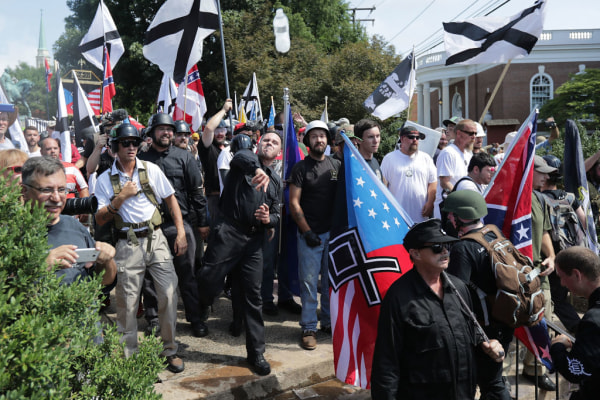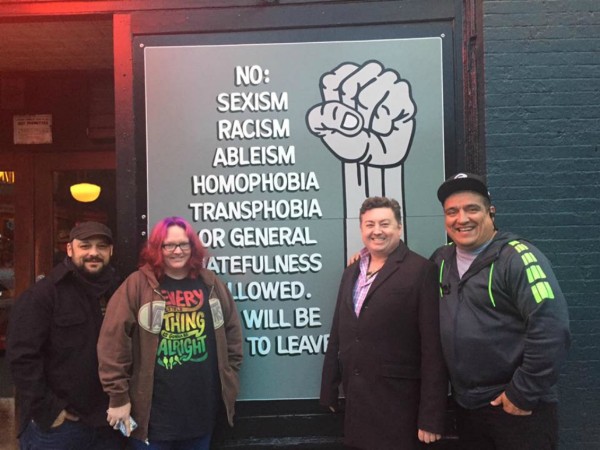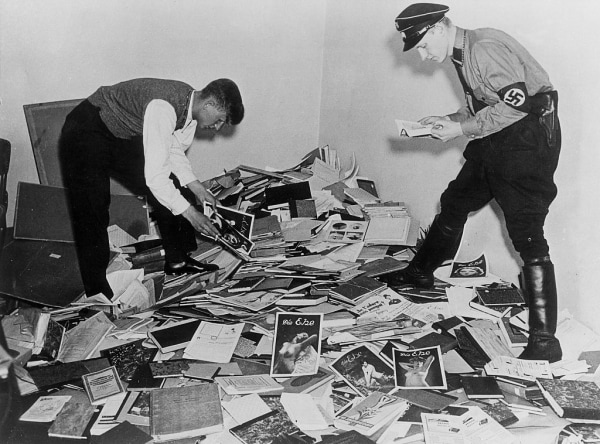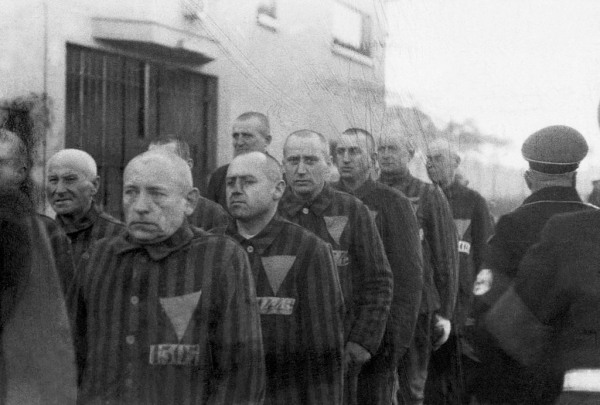So Many Ultra White Nationalist are Anti Gay~ Why?
Hundreds of white nationalists lined the streets of Charlottesville, Va., last Saturday to protest the removal of a Confederate monument. Some waved Confederate and Nazi flags, others brandished shields. They shouted racist and anti-Semitic slurs with chants of “They will not replace us.”
At one point, they chanted in unison: “F--k you, fa---ts!”
What these white, mostly male, presumably heterosexual protesters have in common is a belief in a “white Ethnostate,”according to Southern Poverty Law Center Research Analyst Keegan Hankes. He referred to the so-called “alt-right” or far-right movement as a “grab bag of right-wing ideologies.”

“They believe that white people are being systematically replaced and that inheritance to their homeland is being taken away from them,” Hankes told NBC News.
Since the 2016 election, which advocates say emboldened many right-wing extremists, there has been a reported rise in anti-LGBTQ violence that is disproportionately affecting people of color.
While not all white nationalists are homophobic, Hankes said the majority of right-wing extremists are “virulently anti-LGBT” and share an anxiety and fixation on white birth rates, which is just barely keeping pace with racial minorities. He said some extremists may blame the disparity on the legalization of same-sex marriage.
“There’s this belief that basically white people are being replaced faster than they can reproduce,” Hankes said.
White nationalists are planning more protests across the United States, and Hankes said they are galvanized over a recent video of anti-fascists toppling a Confederate monument in Durham, N.C.
“I haven’t seen them this angry in a long time,” he said.
“At Least They Can’t Breed”
Former white supremacist Angela King, 42, was a propagandist for various neo-Nazi groups in the early 1990s. She admitted to creating propaganda aimed at promoting higher birth rates among white women.

“I did women-centric propaganda-type things,” King said. “I would write articles for some of the racist magazines or papers about things like white women shouldn’t get abortions, but women who aren’t white should.”
The neo-Nazis and skin head King ran with believed gays were sick. She said they didn’t hesitate to ridicule LGBTQ people and abuse them in the streets.
“It was always a joke, that ‘at least they can’t breed,’” recalled King, who has come out as a lesbian since leaving the movement.
In her early 20s, King spent three years in prison for robbing a Jewish-owned store. While serving time, she realized she was attracted to women.
“I knew at a young age that I was attracted to the other little girls and not the little boys,” she said. But her religious upbringing coupled with the homophobia she learned at home gave her a deep sense of shame.
“I was like, ‘Oh, sh-t, something is wrong with me, I’m disgusting, I’m all these horrible things,'” she said. “So it wasn’t until prison that I actually had a relationship and started down the path of acceptance for myself.”
"This Has Just Grown Into This Huge Beast"
The years King spent in prison forced her to reflect on her hateful views, which she said she learned from her parents at an early age. Several black prisoners confronted her over her neo-Nazi tattoos. They insisted she tells them what she would do if she saw them on the street. Would she call them the N-word? Would she hurt them?
“In prison, one cannot just jump up and run away from tough conversations like that, so they held me accountable,” she said. “And another thing they did was they viewed me as a human being, and I really didn’t feel like I deserved that at all.”

A co-founder of the nonprofit Life After Hate, King now works to counter and reform people with extremist views. In recent years, she has nervously watched the far right grow into a more unified front.
“Technology has certainly sped up the rate at which these groups are able to communicate and share information and plan,” she observed.
King said she used a copy machine to make white supremacist propaganda in the 1990s.
“We always had a lot of flyers that were very stereotypical, and there were flyers that mocked just about everything and anything you can imagine: from a gay person to a Jewish person to a person of color too, you name it, someone with a disability,” King recalled.
Today, the same propaganda is created quickly in the form of digital memes and other media that can be shared widely across the internet, she said.
“They are in a completely different format today, but it’s the exact same dehumanization of marginalized people,” she explained.
King said the merger between the so-called "alt-right," whose followers she said tend to eschew Nazi iconography for a cleaner, media-friendly image, and what she called the “violent far right” she once belonged to, is unprecedented.
“They cleaned up the language,” she said. “They made it a little more palatable, and now this has just grown into this huge beast that’s doing this giant snowball downhill.”
We Can't "Pretend Like It's Not Happening"
The backlash against marginalized communities doesn’t surprise the University of Southern California Professor Chris Freeman, whose work primarily focuses on 20th century gay and lesbian studies. With the election of President Barak Obama, American’s first black president, and the legalization of same-sex marriage, the rise of far-right groups is consistent with historical trends, he said.
“Germany was very progressive on issues around sexuality at the turn of the 20th century,” Freeman said. In the years after the First World War, during the Weimar Republic, Berlin was a queer Bohemia, he explained. The city was home to the Institute for Sexual Science, a famed sexology Institute headed by Jewish physician Magnus Hirschfeld.

“His Institute was burned, probably because there were some pretty credible rumors that some of the clients were people who were higher up in the Nazi party,” Freeman said.
While anti-Semitism was at the heart of Nazi ideology, some of the frenzies that led to its uprising can be attributed to far-right hostility toward the sexual liberation of the 1920s, Freeman explained. As the country grew increasingly progressive, he said, more and more Nazis were elected.
“There was a push that was pretty likely to be successful in Germany in the 1920s and early '30s to repeal anti-gay laws,” Freeman added, "and then that all went belly-up when the Nazis took over.”
After Adolf Hitler came to power in 1933, the Nazis began the widespread persecution of gay men. It is estimated that between 5,000 and 15,000perished in concentration camps.

“So in terms of thinking about the politics of the far right, it’s reactionary politics, and it’s based on fear and hatred,” Freeman added.
The professor sees parallels between the rise of Nazism in Germany and the far right in the United states.
“People who believe in this idealized past that does not exist are panicked because [of] the visibility of queer people in the movement for our acceptance and the potential meltdown of the gender binary,” Freeman explained.
What’s different, he said, is that the world now has a history of what Nazism is and what it led to, which it didn’t have 75 years ago.
“We don’t have the ability to pretend like it’s not happening,” Freeman said.
White People Must "Have Conversations With Our Fellow White People”
For King, who was forced to confront her own prejudice and still lives in its shadow, bigotry is a hard problem to solve. She said most extremists are not willing to listen, and even non-extremists have trouble understanding what marginalized groups go through.
“There was a while where I was in the mentality where I was like, ‘Well, I’m part of the gay community, I’m marginalized, I know how it feels,” she said. Then, in 2016, a gunman massacred 49 people at Pulse nightclub, an Orlando gay venue, and she felt afraid for the first time.
“I couldn’t attend [the vigil] because I was so afraid that someone like I used to be was going do something,” she explained.
King said it was “a heavy experience to have.”
“I think it’s the kind of experience that every American needs to have in some way to get an idea of what their fellow human beings go through,” she said.
It’s important to engage people with extremist views and challenge their beliefs, King said. But she noted that people of color can’t be expected to have conversations with extremists marching through their towns with torches and swastika flags.
“I think it really is up to white people to have conversations with our fellow white people,” King added.
by
Follow NBC Out
Comments